
Image from Unlocking Detention 2016, submitted by René Cassin
This morning, the report of the unannounced inspection of Morton Hall detention centre in Lincolnshire, has been released. All of the UK’s detention centres are subject to independent inspection by HM Inspectorate of Prisons, and this latest inspection took place in November 2016. The reports shed some light on a still-hidden aspect of the UK’s asylum and immigration system. [Trigger warning: self-harm, suicide]
Morton Hall used to be a woman’s prison, before becoming a detention centre in 2011 (or “immigration removal centre” to use the government’s misleading phrase – over half of those detained in detention centres across the UK are released back into the community). It holds nearly 400 men.
As the inspection report states, the detention centre still “looks and feels like a prison, with a great deal of razor wire in evidence”. The centre is run by the Prison Service, unlike the majority of the UK’s detention centres which are run by private security companies.
The reports tells of “… very high levels of frustration felt by many of the detainees. Their frustration was fuelled by the fact that many of them had spent a considerable time in detention, and for many there was no clear pathway towards release.”
This feeling of limbo due to the indefinite nature of detention was echoed by someone detained there who spoke to protesters on 11 March (see below):
“There is no release day. People been here years. Got no release date.”
Long-term detention is a problem across the detention estate, and this is reflected in the inspection report on Morton Hall:
Too many detainees were held for prolonged periods: 31 had been held for over a year, including three who had been detained for two years, and an additional two men had been detained on separate occasions totalling more than three years.
With no time-limit on detention, this kind of long-term, harmful detention is bound to happen. The UK is the only country in Europe without a time-limit on detention.
The harm and uncertainty of detention rings out clearly in this carefully worded report. The inspection found that incidents of self-harm had tripled since the last inspection of Morton Hall. There had been one self-inflicted death, and many more suicide attempts. Many people reported feeling unsafe.
All of the people Right to Remain works with who have experienced detention are marked by it: the harm does not end with release. The policy of detention is proof of a society harming itself – locking tens of thousands of people up per year, with many more living in constant fear this will happen to them. Just because they do not have the correct immigration papers. This has to stop.
Earlier this month, protesters had gathered outside Morton Hall to demand an end to all immigration detention and show solidarity with those inside.
A member of South Yorkshire Migration and Asylum Action Group writes of the 11 March protest:
A man managed to climb up the internal fence, and was still there as we left 2 hours later. His cries for “freedom” and “we will not be prisoners” were heard. One supporter climbed a tree and could see over 40 people in the yard, protesting. Through writing a number on a placard, those in the court yard called through. Using a microphone we heard their voices. The voices were fast and emotive and desperate.

Below I have shared, there demands and their pleads. As we left we promised we would share to the world what they told us what they had said. In response we heard “When you go we go, thank you we am here.”
One person inside informed us that the detention staff had put on music and give ice cream to attempt to ensure those inside didn’t hear us. “They play music and stop is being outside. They also bring ice cream. When we heard chants and we managed to get outside. We then heard it was people supporting us people.”
Some one else also tells us this “we heard the protesting and try to stop us going outside but we manage to. They tell us its about football team.”
“They don’t want you seeing what’s happening in here.”
People told of how they were being denied health care. One of the protesters who had previously been held in Morton Hall, told us, “There been 2 deaths in Morton Hall this year.” He explained the reason for why one of the men died. He died because, “he not given medical attention. You will be next if you don’t stand up for your freedom against oppression.”
They told us about the bad conditions: “They lock us up like prison and its bad condition. They don’t want to show us how we are living here. People taking their lives.”
They talked about the pain of indefinite detention: “we have no release date. You no idea what detention does to your mind and body.”
They expressed their isolation and the lack of contact from their families repeat. For example, “Some not seem family for years. No camera phones to see our grand children.”
A man outside who was previously in Morton Hall, passionately states the fundamental importance of fighting to those inside. “You have to fight. Never work for £1 an hour. If refuse to cook and clean place will not run. Keep fighting!!”



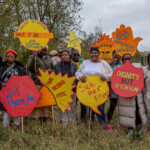
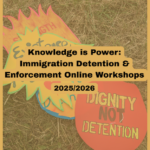
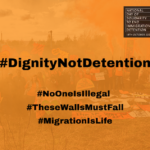

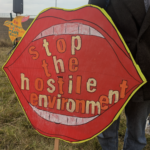



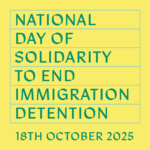
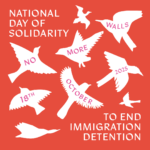
Discussion: